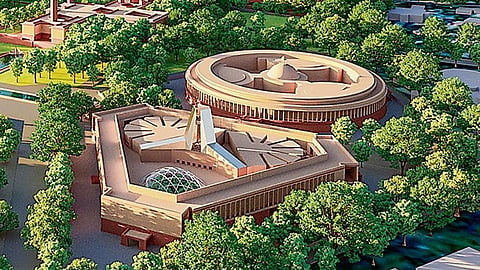SC refuses nod to same-sex marriage, leaves it to Parl
One-liner: The court can't make law but only interpret it and it is for Parliament to change the Special Marriage Act, Chief Justice of India (CJI) D Y Chandrachud said on Tuesday while pronouncing his verdict on 21 pleas seeking legal validation for same-sex marriages.
Four judgements: At the outset, Justice Chandrachud said there are four judgments -- by himself, Justices Sanjay Kishan Kaul, S Ravindra Bhat and P S Narasimha -- in the matter. Justice Hima Kohli is also a part of the five-judge bench.
Queer is natural phenomenon: Directing the Centre, states and Union Territories (UTs) to ensure that the queer community is not discriminated against, the CJI, who is heading the constitution bench, said queer is a natural phenomenon known for ages and is neither urban nor elitist.
Certain rights for queers: Justice Kaul said he agrees with the CJI on the grant of certain rights to queer couples.
- "Non-heterosexual and heterosexual unions must be seen as both sides of the same coin. That legal recognition of non-heterosexual unions is a step towards marriage equality.” - Kaul
Just Bhat differs with CJI: Justice Bhat, who read out the operative portion of his verdict, said he agrees and differs with views of the CJI on certain points.
Parliament must decide: Delivering his verdict on the critical issue, the CJI said it is for Parliament to decide whether there is a need for a change in the regime of the Special Marriage Act.
- "This court can't make law. It can only interpret it and give effect to it," he said.
Centre forming panel on rights for queers: Justice Chandrachud said the court has recorded Solicitor General Tushar Mehta's statement that the Centre will form a committee to decide the rights and entitlements of persons in queer unions.
Centre, states asked to sensitise public about queers: While reading out the operative portion of his verdict, he directed the Centre, states and UTs to take steps to sensitise public about queer rights and ensure that inter-sex children are not allowed sex-change operations at an age they cannot fully comprehend consequence.
Direction to police: The CJI directed the police to conduct a preliminary enquiry before registering an FIR against queer couple over their relationship.
Issue not an urban concept: He said homosexuality or queerness is not an urban concept or restricted to the upper class.
- To imagine queer as existing only in urban spaces would be like erasing them and queerness can be regardless of one's caste or class, Justice Chandrachud said. He said it would be incorrect to state that marriage is a "static and unchanging institution".
Choosing life partner linked to liberty: Justice Chandrachud said the ability to choose a life partner goes to the roots of the right to life and liberty under Article 21 of the Constitution.
Failure to recognise is discriminatory: The right to enter into a union includes the right to choose a partner and its recognition, the CJI said, adding that failure to recognise such an association would be discriminatory.
Equity demand recognised: The CJI said this court has recognised that equality demands that queer persons are not discriminated against.


